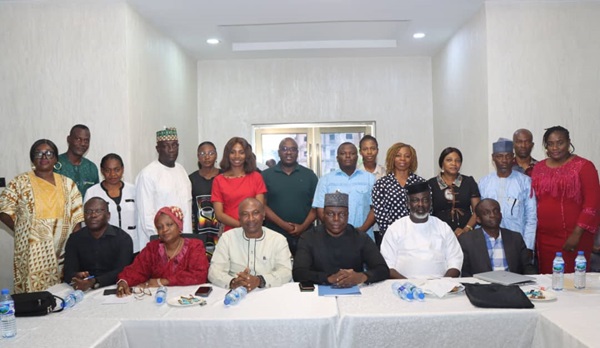
The director-general of the National Biotechnology Research and Development Agency (NBRDA), Prof. Abdullahi Mustapha has stated that genome editing (GEd) represents a significant technological advancement with the potential to boost agricultural productivity in Nigeria.
He made this assertion during a two-day training and sensitisation workshop for policymakers and regulators on genome editing, organised by NBRDA in collaboration with the Centre of Excellence in Science, Technology, and Innovation (CoE-STI), AUDA-NEPAD, in Abuja, Nigeria.
In his remarks, Mustapha emphasised that GEd is one of the most transformative advances in biotechnology, capable of revolutionising sectors from medicine to agriculture. However, he stressed the importance of understanding the science behind it, as well as its policy, funding and regulatory requirements.
“The Continental Genome Editing (GEd) Science Communication and Advocacy Initiative was launched to bring together stakeholders and experts to drive the utilization and acceptance of genome editing technology in agriculture across Africa,” Mustapha explained. “The aim is to expedite the realisation of Agenda 2063 – The Africa We Want – by building capacity, improving agricultural productivity, alleviating poverty, enhancing nutrition and food quality and ensuring food security, among other goals. This initiative will also help Africa become competitive both continentally and globally.”
He highlighted that through this initiative, NBRDA and CoE-STI have created opportunities for stakeholders from various sectors to engage and drive the effective application of GEd technology. This includes incorporating GEd into tertiary curricula, fostering public understanding and expanding human and infrastructural capacity for local production using GEd technologies.
“Nigeria is the first country on the continent to enact legislation and regulation for the application of genome editing and synthetic biology techniques, a significant milestone. Additionally, a National Communication and Advocacy Strategy on Genome Editing has been developed under this initiative,” he added.
Mustapha noted that the training provides a platform to delve into the science of genome editing, its application in agriculture and the ethical considerations guiding its use. The goal, he said, is to equip participants with the knowledge to make informed decisions that support innovation, ensure adequate funding and balance public safety with ethical standards.
“I commend all participants for approaching these discussions with dedication and collaboration. Together, we can shape policies, legislation and regulatory frameworks that will allow Nigeria to harness the full potential of GEd while protecting societal values,” Mustapha said.
In his address, the Head of the CoE-STI at AUDA-NEPAD, Prof. Olalekan Akinbo underscored the workshop’s importance in equipping policymakers with the information necessary to make informed decisions on regulating the genome editing sector. He pointed out the dangers of misinformation surrounding the technology and stressed the need for research and policy to work in tandem.
“When there is a knowledge gap, misinformation is inevitable. When the understanding of a subject is low, defending it in the public space becomes difficult. Your knowledge is the strength of your advocacy. Without accurate information from trusted sources, discussions become vague and unsubstantiated,” Akinbo explained.
He emphasised that the workshop aimed to provide policymakers with the knowledge they need to create policies that guide the country’s future decisions regarding genome editing. “If policies are not aligned with national interests or are based on misinformation, they become mere paper documents rather than guiding principles,” he added.
Similarly, permanent secretary of the Federal Ministry of Innovation, Science, and Technology, Mrs. Esuabana Nko-Asanye highlighted the importance of bringing together key stakeholders such as policymakers, legislators, and regulators, who play a critical role in shaping the future of biotechnology in Nigeria.
“Your engagement in this workshop is essential for deepening your understanding of genome editing and ensuring that Nigeria is positioned to leverage this technology responsibly. The knowledge gained here will empower you to advocate for policies that support the safe and ethical application of genome editing, which is crucial for addressing challenges such as food security, public health and environmental sustainability,” Nko-Asanye stated.
In her welcome address, director of the genetics, genomics and bioinformatics department at NBRDA, Dr. Shakirat Ajenifujah-Solebo emphasised the importance of policymakers’ involvement in shaping the future of science and technology in Nigeria.
“Your understanding and advocacy are vital in mobilising the political, legislative, and financial resources needed to harness the full potential of this groundbreaking science. Genome editing offers tremendous possibilities for revolutionising agriculture, from improving crop yields to enhancing pest and disease resistance and adapting to climate change,” she said.
Ajenifujah-Solebo noted that advancing this technology positions Nigeria as a leader in scientific progress, ensuring the country is not left behind in the global push for sustainable development.
Speaking to journalists, clerk of the House Committee on Science and Technology, Ukachukwu Chidiebere identified science as the foundation of any nation’s development. He emphasised the need for Nigeria to invest in science, technology and innovation (STI), as it underpins every other sector of the economy.
“This two-day programme has fostered awareness and collaboration among National Assembly clerks and bureaucrats. We have had fruitful discussions, reviewed concerns and encouraged Nigeria and other African nations to take control of their destinies when it comes to this innovative science. Genome editing holds the potential to improve agriculture significantly,” Chidiebere stated.
He acknowledged that while there is still much to be done in addressing various issues, the workshop has laid the groundwork for progress. “We’ve gained new insights, questioned some established narratives, and I’m confident we are on the path to making meaningful advancements,” he concluded.
This workshop marks a significant step toward ensuring Nigeria harnesses the potential of genome editing technology to boost agricultural productivity and drive sustainable development in line with national and continental goals.


